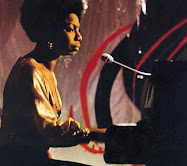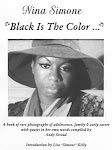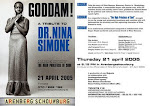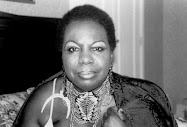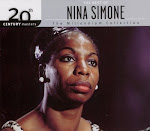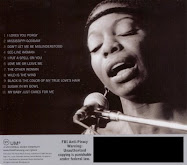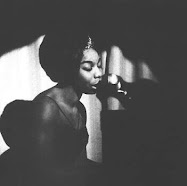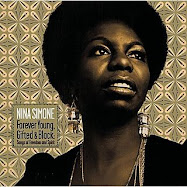

Cassandra Wilson
By Nicole Nelson
Cassandra Wilson is often described as not only an accomplished jazz vocalist and composer but also as a lyricist, producer, musical director, guitarist and pianist . Born in Jackson, Mississippi, in 1955, Cassandra Wilson has been singing and performing since she sang at her brother’s kindergarten graduation at the age of five. The youngest of three children, Wilson began playing the piano and guitar at the age of nine. Cassandra attributes her interest in music to her parents. Her mother, who is a retired elementary school teacher, and father, who is a bass guitarist, often sang to her as a small child. Her father introduced her to jazz . Jazz was not a very popular form of music during the 1960’s, but Cassandra loved it so much that she wanted to share it with others . Wilson took lessons in classical piano for six years, before learning to play acoustic guitar. She enjoyed experimenting with the guitar, and the instrument soon became her favorite. Between the ages of eleven and fifteen, she wrote about twenty original songs
Cassandra Wilson Feeling It All Playlist

A former classmate, Dr. Phillip Nelson, recalls a time when she shared her newfound love for jazz with the entire student body at a Jackson's Powell Junior High School talent show. “You have to remember that at that time the only thing we listened to was R&B, and she got on stage with a guitar and played a type of music no one had really heard before. It was much like a ballad, and although she didn’t get a lot of attention (there was a lot of talking going on), she didn’t get booed off stage either. I was impressed by the courage she demonstrated to sing an alternative selection. She sang well. She had a great stage presence, and although she didn’t play anything popular, she was good enough to have people stand there and listen to her, and that’s when I realized that she had broader experiences, at least musically than most people at that age. She sang that song because she loved it, and she didn’t care if you liked that song or not, and I respected her for that”.

When Cassandra was in the ninth grade, the schools were desegregated in Mississippi. Her ninth and tenth-grade years were difficult as Cassandra recalls but were better for the remainder of her high school years. Despite the racial tensions that were present in her new school setting, she eventually adjusted to her environment. In the eleventh grade, she got the leading role as Dorothy in The Wizard of Oz. “ For all the negative aspects, experiencing things that were different from what I knew was also exciting,” says Cassandra in an interview for The Oxford American in its 1997 music issue. Obtaining the starring role in the high school musical was not the first time Cassandra stepped over the color lines and made a mark for herself and others. During her last years in high school, Wilson formed a musical group with two young men who were both white. “She had difficulty (with classmates) because of the relationship she chose to have, but you had to respect the choice she made” . Wilson saw her interracial music group as a growing period for her life as well as for others. “Music was the way we (blacks and whites) came together. We traded albums at school. I remember hearing James Taylor and then really getting into Joni Mitchell. I turned some of my friends on to jazz they hadn’t heard before” .
After obtaining a degree from Jackson State University in mass communication, Wilson moved from Mississippi to New Orleans and worked as an assistant in Public Affairs at a local television station. In 1982, Wilson moved to New York. She began recording widely in the 1980’s initially with Steve Coleman and Henry Threadgill’s New Air group. She became the main vocalist with their M/Base collection. During her first decade in New York, she released seven records on the JMT/Verve label while she also sang on other innovative projects for other singers . By 1993 she had sung on ten albums produced by JMT records with a wide variety of New York musicians, including Mulgrew Miller and Greg Osby .

Cassandra’s music has often been compared to artists like Betty Carter, Nina Simone, and Shirley Horn, whom she also considers to be some of her musical influences. Billy Holiday and Sarah Vaugh also influenced her . Cassandra has come a long way from her high school music group and late-night singing at local clubs. Cassandra now concentrates more on the pure innovative production of her own music albums. If Cassandra Wilson’s intentions are to open people’s eyes to the broadness of her music through the messages in her songs, then she is well on her way to achieving her goal. Wilson’s emotional range and tone variations impress many critics, audiences, and fellow musicians. Many critics write that she is one of the most promising musicians on the horizon. She has received many awards due to her sensual and soulful voice. In her own hometown of Jackson, Mississippi, she was selected to receive the 1997 Governor’s Award for excellence in the Arts. Unfortunately, she was unable to accept this award due to her tour with Wynton Marsalis. Her tour, entitled Blood on the Fields, was Grammy-nominated for best vocal performance. Wilson won the “best jazz vocalist” Grammy award for her album New Moon Daughter. Her album New Moon Daughter has been described as one of her best albums, with vocals that carry sultry and contralto undertones. Cassandra’s album Blue Light Til’ Dawn was so well done that it won her the Downbeat’s “Singer of the Year” title for 1994 and 1995. In 1996, this album also won her the same honor in Down Beat’s Critic poll .She also has appeared on screen in the Arnold Schwarzenegger movie Junio.

Cassandra Wilson is not overly concerned with what other people think of her or how she performs.
She was named “most important and daring jazz vocalist” by Time magazine in 1996. According to one writer for the internet website “Lush Lives,” Cassandra Wilson is one of the top jazz singers of the 1990s. The writer continues, "Blessed with a distinctive and flexible voice, she is not afraid to take chances. Listeners can only wonder if Cassandra’s unique sense of singing is what attributes to her rising success. “I’m interested in crossing boundaries,” explains Wilson, “to be able to operate in several worlds at once is the result of being open-minded, whether in music or some other part of the experience. I still believe that things have to fall apart before something new can emerge. That’s true for everything, including music”

Wilson expresses herself through her music. She has become well-loved and admired because of her ability not only to sell her music but herself in the process. Senator John Horhn states that the reason Cassandra has become so successful is that she makes the music her own. “That, in turn, is why people love her so much because you feel what she is trying to tell you”. Wilson sings with the intent of getting a message to her listeners. She sings with her heart and so much of her soul that it seems as though she is literally singing to you. “ However much this life consumes me, however unbalanced things get, I always want to remember that when I look into someone else’s I am seeing myself”. There is absolutely no doubt that at the rate Cassandra is going, her contralto, sensual voice, and down-to-earth personality will draw a lot of fans for a long time to come.
Since winning the Grammy award for her vocal stylings on New Moon Daughter in 1997, the call of the Delta has been beckoning her. She is currently working on a CD with 81-year-old Boogaloo Ames and his partner Eden Brent tentatively to be called Belly of the Sun. (Note: Belly of the Sun was produced but without Ames or Brent--possibly due to the death of Ames. The CD was also to include Jackson musicians Jesse Robinson on guitar, Nellie McGinnis on bass, and Rhonda Richmond on guitar).

2009 UPDATE: Cassandra Wilson won a Grammy Award for her album Loverly in 2009 as well as the 2009 Mississippi Governor's Award for Artistic Excellence in Music.

A former classmate, Dr. Phillip Nelson, recalls a time when she shared her newfound love for jazz with the entire student body at a Jackson's Powell Junior High School talent show. “You have to remember that at that time the only thing we listened to was R&B, and she got on stage with a guitar and played a type of music no one had really heard before. It was much like a ballad, and although she didn’t get a lot of attention (there was a lot of talking going on), she didn’t get booed off stage either. I was impressed by the courage she demonstrated to sing an alternative selection. She sang well. She had a great stage presence, and although she didn’t play anything popular, she was good enough to have people stand there and listen to her, and that’s when I realized that she had broader experiences, at least musically than most people at that age. She sang that song because she loved it, and she didn’t care if you liked that song or not, and I respected her for that”.

When Cassandra was in the ninth grade, the schools were desegregated in Mississippi. Her ninth and tenth-grade years were difficult as Cassandra recalls but were better for the remainder of her high school years. Despite the racial tensions that were present in her new school setting, she eventually adjusted to her environment. In the eleventh grade, she got the leading role as Dorothy in The Wizard of Oz. “ For all the negative aspects, experiencing things that were different from what I knew was also exciting,” says Cassandra in an interview for The Oxford American in its 1997 music issue. Obtaining the starring role in the high school musical was not the first time Cassandra stepped over the color lines and made a mark for herself and others. During her last years in high school, Wilson formed a musical group with two young men who were both white. “She had difficulty (with classmates) because of the relationship she chose to have, but you had to respect the choice she made” . Wilson saw her interracial music group as a growing period for her life as well as for others. “Music was the way we (blacks and whites) came together. We traded albums at school. I remember hearing James Taylor and then really getting into Joni Mitchell. I turned some of my friends on to jazz they hadn’t heard before” .
After obtaining a degree from Jackson State University in mass communication, Wilson moved from Mississippi to New Orleans and worked as an assistant in Public Affairs at a local television station. In 1982, Wilson moved to New York. She began recording widely in the 1980’s initially with Steve Coleman and Henry Threadgill’s New Air group. She became the main vocalist with their M/Base collection. During her first decade in New York, she released seven records on the JMT/Verve label while she also sang on other innovative projects for other singers . By 1993 she had sung on ten albums produced by JMT records with a wide variety of New York musicians, including Mulgrew Miller and Greg Osby .

Cassandra’s music has often been compared to artists like Betty Carter, Nina Simone, and Shirley Horn, whom she also considers to be some of her musical influences. Billy Holiday and Sarah Vaugh also influenced her . Cassandra has come a long way from her high school music group and late-night singing at local clubs. Cassandra now concentrates more on the pure innovative production of her own music albums. If Cassandra Wilson’s intentions are to open people’s eyes to the broadness of her music through the messages in her songs, then she is well on her way to achieving her goal. Wilson’s emotional range and tone variations impress many critics, audiences, and fellow musicians. Many critics write that she is one of the most promising musicians on the horizon. She has received many awards due to her sensual and soulful voice. In her own hometown of Jackson, Mississippi, she was selected to receive the 1997 Governor’s Award for excellence in the Arts. Unfortunately, she was unable to accept this award due to her tour with Wynton Marsalis. Her tour, entitled Blood on the Fields, was Grammy-nominated for best vocal performance. Wilson won the “best jazz vocalist” Grammy award for her album New Moon Daughter. Her album New Moon Daughter has been described as one of her best albums, with vocals that carry sultry and contralto undertones. Cassandra’s album Blue Light Til’ Dawn was so well done that it won her the Downbeat’s “Singer of the Year” title for 1994 and 1995. In 1996, this album also won her the same honor in Down Beat’s Critic poll .She also has appeared on screen in the Arnold Schwarzenegger movie Junio.

Cassandra Wilson is not overly concerned with what other people think of her or how she performs.
She was named “most important and daring jazz vocalist” by Time magazine in 1996. According to one writer for the internet website “Lush Lives,” Cassandra Wilson is one of the top jazz singers of the 1990s. The writer continues, "Blessed with a distinctive and flexible voice, she is not afraid to take chances. Listeners can only wonder if Cassandra’s unique sense of singing is what attributes to her rising success. “I’m interested in crossing boundaries,” explains Wilson, “to be able to operate in several worlds at once is the result of being open-minded, whether in music or some other part of the experience. I still believe that things have to fall apart before something new can emerge. That’s true for everything, including music”

Wilson expresses herself through her music. She has become well-loved and admired because of her ability not only to sell her music but herself in the process. Senator John Horhn states that the reason Cassandra has become so successful is that she makes the music her own. “That, in turn, is why people love her so much because you feel what she is trying to tell you”. Wilson sings with the intent of getting a message to her listeners. She sings with her heart and so much of her soul that it seems as though she is literally singing to you. “ However much this life consumes me, however unbalanced things get, I always want to remember that when I look into someone else’s I am seeing myself”. There is absolutely no doubt that at the rate Cassandra is going, her contralto, sensual voice, and down-to-earth personality will draw a lot of fans for a long time to come.
Since winning the Grammy award for her vocal stylings on New Moon Daughter in 1997, the call of the Delta has been beckoning her. She is currently working on a CD with 81-year-old Boogaloo Ames and his partner Eden Brent tentatively to be called Belly of the Sun. (Note: Belly of the Sun was produced but without Ames or Brent--possibly due to the death of Ames. The CD was also to include Jackson musicians Jesse Robinson on guitar, Nellie McGinnis on bass, and Rhonda Richmond on guitar).

2009 UPDATE: Cassandra Wilson won a Grammy Award for her album Loverly in 2009 as well as the 2009 Mississippi Governor's Award for Artistic Excellence in Music.
Wilson was married to Anthony Wilson from 1981 to 1983. She has a son, Jeris, born in the late 1980s. She and her son lived in Harlem, New York, for a while. In 2000, Wilson married actor Isaach de Bankolé, who directed her in the concert film Traveling Miles: Cassandra Wilson (2000).

Wilson has won several awards for her music on her album named New Moon Daughter. She was named female singer of the year in 1994 and 1995 in (DownBeat Reader’s Poll), and her album was No.1 for Best Music of 1996 (Time Magazine,1993). Ebony selected her one of America’s fifteen most beautiful black women. She has been on the cover of Essence magazine. DownBeat Magazines selected her Female vocalist of the year for 1996. Esquire named her one of the year's “Women we love” under the headlines “Diva of Desire.” A New York Times critic has called the album “One of the best albums of the decade.” Time Magazine says that she is the most accomplished jazz vocalist of her time. Her album New Moon Daughter on Blue Note Records is about different kinds of relationships and the cycles they go through. She was the first singer of her generation to win Jazz Vocalist of the year in 1993. The song “Blue Light til Dawn" examines her roots in jazz music. Her album New Moon Daughter won a Grammy award in 1997. However, Wilson's musical interests range from jazz to popular music, rhythm, and blues to folk, blues to rock.

The voice is more visual than audible; shaded, iridescent, tangible, substantial. It seems to flow effortlessly. Read any of the dozen or so biographies on Cassandra Wilson and you’ll discover some basics: born and reared in Jackson, Mississippi in the 1960s and 70s by musician and educator parents.
Classically trained on piano from age 6 until the age of 13, she also received further musical instruction as a clarinetist for the concert and marching bands of secondary school. During the 70s, she could be found performing Joni Mitchell songs behind an acoustic guitar, or singing with a blues band in Little Rock, Arkansas, in front of a large funk band in Jackson, or in the company of long-time friends in an all-girls ensemble. In the eighties, Cassandra moved to New Orleans where she performed with local luminaries Earl Turbinton and Ellis Marsalis. After a year, she relocated to East Orange, New Jersey where she made a decision to take her chances on the New York jazz scene. After a stint as the main vocalist with Steve Coleman’s M-Base Collective, Cassandra began recording on her own.

Although her recording career has been somewhat erratic, Cassandra Wilson became one of the top jazz singers of the '90s, a vocalist blessed with a distinctive and flexible voice who is not afraid to take chances. She began playing piano and guitar when she was nine and was working as a vocalist by the mid-'70s, singing a wide variety of material. Following a year in New Orleans, Wilson moved to New York in 1982 and began working with Dave Holland and Abbey Lincoln. After meeting Steve Coleman, she became the main vocalist with the M-Base Collective. Although there was really no room for a singer in the overcrowded free funk ensembles, Wilson did as good a job of fitting in as was possible. She worked with New Air and recorded her first album as a leader in 1985. By her third record, a standards date, she was sounding quite a bit like Betty Carter.

After a few more albums in which she mostly performed original and rather inferior material, Cassandra Wilson changed directions and performed an acoustic blues-oriented program for Blue Note called Blue Light 'Til Dawn. By going back in time, she had found herself, and Wilson has continued interpreting in fresh and creative ways vintage country blues and folk music up until the present day. During 1997 she toured as part of Wynton Marsalis' Blood on the Fields production. Traveling Miles, her tribute to Miles Davis, followed two years later. For 2002's Belly of the Sun, she drew on an array of roots musics -- blues, country, soul, rock -- to fashion a record that furthered her artistic career while still aligning well with trends in popular music. Glamoured, released in 2003, posed a different kind of challenge; half the material was composed by Wilson herself. Unwilling to stand still, Wilson gently explored sampling and other hip-hop techniques for 2006's Thunderbird. Wilson followed Loverly, another album of standards in 2008, and Silver Pony in 2010.
Cassandra Wilson - Round Midnight - HQ
Cassandra Wilson - Resurrection Blues (Tutu)
Cassandra Wilson at Chicago Jazz Festival 2011 Playlist

Wilson has won several awards for her music on her album named New Moon Daughter. She was named female singer of the year in 1994 and 1995 in (DownBeat Reader’s Poll), and her album was No.1 for Best Music of 1996 (Time Magazine,1993). Ebony selected her one of America’s fifteen most beautiful black women. She has been on the cover of Essence magazine. DownBeat Magazines selected her Female vocalist of the year for 1996. Esquire named her one of the year's “Women we love” under the headlines “Diva of Desire.” A New York Times critic has called the album “One of the best albums of the decade.” Time Magazine says that she is the most accomplished jazz vocalist of her time. Her album New Moon Daughter on Blue Note Records is about different kinds of relationships and the cycles they go through. She was the first singer of her generation to win Jazz Vocalist of the year in 1993. The song “Blue Light til Dawn" examines her roots in jazz music. Her album New Moon Daughter won a Grammy award in 1997. However, Wilson's musical interests range from jazz to popular music, rhythm, and blues to folk, blues to rock.

The voice is more visual than audible; shaded, iridescent, tangible, substantial. It seems to flow effortlessly. Read any of the dozen or so biographies on Cassandra Wilson and you’ll discover some basics: born and reared in Jackson, Mississippi in the 1960s and 70s by musician and educator parents.
Classically trained on piano from age 6 until the age of 13, she also received further musical instruction as a clarinetist for the concert and marching bands of secondary school. During the 70s, she could be found performing Joni Mitchell songs behind an acoustic guitar, or singing with a blues band in Little Rock, Arkansas, in front of a large funk band in Jackson, or in the company of long-time friends in an all-girls ensemble. In the eighties, Cassandra moved to New Orleans where she performed with local luminaries Earl Turbinton and Ellis Marsalis. After a year, she relocated to East Orange, New Jersey where she made a decision to take her chances on the New York jazz scene. After a stint as the main vocalist with Steve Coleman’s M-Base Collective, Cassandra began recording on her own.

Although her recording career has been somewhat erratic, Cassandra Wilson became one of the top jazz singers of the '90s, a vocalist blessed with a distinctive and flexible voice who is not afraid to take chances. She began playing piano and guitar when she was nine and was working as a vocalist by the mid-'70s, singing a wide variety of material. Following a year in New Orleans, Wilson moved to New York in 1982 and began working with Dave Holland and Abbey Lincoln. After meeting Steve Coleman, she became the main vocalist with the M-Base Collective. Although there was really no room for a singer in the overcrowded free funk ensembles, Wilson did as good a job of fitting in as was possible. She worked with New Air and recorded her first album as a leader in 1985. By her third record, a standards date, she was sounding quite a bit like Betty Carter.

After a few more albums in which she mostly performed original and rather inferior material, Cassandra Wilson changed directions and performed an acoustic blues-oriented program for Blue Note called Blue Light 'Til Dawn. By going back in time, she had found herself, and Wilson has continued interpreting in fresh and creative ways vintage country blues and folk music up until the present day. During 1997 she toured as part of Wynton Marsalis' Blood on the Fields production. Traveling Miles, her tribute to Miles Davis, followed two years later. For 2002's Belly of the Sun, she drew on an array of roots musics -- blues, country, soul, rock -- to fashion a record that furthered her artistic career while still aligning well with trends in popular music. Glamoured, released in 2003, posed a different kind of challenge; half the material was composed by Wilson herself. Unwilling to stand still, Wilson gently explored sampling and other hip-hop techniques for 2006's Thunderbird. Wilson followed Loverly, another album of standards in 2008, and Silver Pony in 2010.
Cassandra Wilson - Round Midnight - HQ
Cassandra Wilson - Resurrection Blues (Tutu)












































